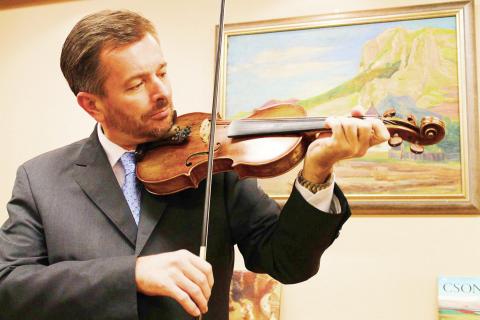Hungary’s outgoing representative to Taiwan described his posting in Taiwan as “a gift,” saying that he would never forget the three years he spent here.
Levente Szekely, who is scheduled to leave Taiwan this week, said that Taiwan was his first assignment in Asia since he became a career diplomat 25 years ago.
“Taiwan is by far the best post I’ve had,” he said in a recent interview.

Photo: CNA
He said he was impressed by the greenness of Taipei when he first arrived and the friendliness of its residents. He said he made many Taiwanese friends, including those in the diplomatic community and from other sectors.
One of the friends he made is Hsu Wen-Lung (許文龍), founder of Chi Mei Group, the violinist-turned-diplomat said.
They once played a classic Mandarin song, The Moon Represents My Heart (月亮代表我的心), together on violins collected by Hsu, Szekely said, adding that Hsuhas a large private collection of the world’s most famous violins.
He also took the opportunity to thank the Ministry of Foreign Affairs for supporting his initiatives promoting bilateral exchanges.
Among his achievements was a series of events to promote cultural exchanges with Taiwan last year, in partnership with three other Central European nations — the Czech Republic, Poland and Slovakia.
He said Taiwan has demonstrated that “Chinese culture and democracy work perfectly together,” adding that Taiwan preserves traditional Chinese culture and is a vibrant democracy.
Asked about last year’s Sunflower movement, he said it was a positive thing that “the younger generation is willing to take the future in their hands, because it is about their future.”
On a more personal level, Szekely said he loves seafood and fruit in Taiwan.
Lobsters, oysters and shrimp are among his favorites when it comes to seafood, said the diplomat, who is from a landlocked nation where fresh seafood is rare.
He also gave a thumbs-up to Taiwanese fruit, especially mangoes.
He said his experience in Taiwan has been mostly positive, but if he had to name one negative thing, it would be the crazy traffic and scooter riders.
“They look like they want to die,” he said, adding that he was lucky to have an excellent driver, who never cursed or honked at scooters.
Over the past three years, Szekely has been devoted to promoting bilateral relations in several areas. For example, the two nations have signed agreements on agricultural cooperation and on a reciprocal working holiday program.
He was also the driving force behind the importation of Hungarian “low-cholesterol pork” and Hungarian wine to Taiwan.
After three years in Taiwan, he said he would leave with “a very sad heart.”
Taiwan has left a deep impression on him and his wife, he said, promising that he would always be a spokesperson for Taiwan.
“We were supposed to stay four years. Now it has been cut short,” he said. “It is very sad that I have to leave. My only hope is that I will be able to return.”
“We will never forget these three years. This was a gift, the best part of my career, of our lives generally,” he said.

Chinese Nationalist Party (KMT) Chairman Eric Chu (朱立倫), spokeswoman Yang Chih-yu (楊智伃) and Legislator Hsieh Lung-chieh (謝龍介) would be summoned by police for questioning for leading an illegal assembly on Thursday evening last week, Minister of the Interior Liu Shyh-fang (劉世芳) said today. The three KMT officials led an assembly outside the Taipei City Prosecutors’ Office, a restricted area where public assembly is not allowed, protesting the questioning of several KMT staff and searches of KMT headquarters and offices in a recall petition forgery case. Chu, Yang and Hsieh are all suspected of contravening the Assembly and Parade Act (集會遊行法) by holding

PRAISE: Japanese visitor Takashi Kubota said the Taiwanese temple architecture images showcased in the AI Art Gallery were the most impressive displays he saw Taiwan does not have an official pavilion at the World Expo in Osaka, Japan, because of its diplomatic predicament, but the government-backed Tech World pavilion is drawing interest with its unique recreations of works by Taiwanese artists. The pavilion features an artificial intelligence (AI)-based art gallery showcasing works of famous Taiwanese artists from the Japanese colonial period using innovative technologies. Among its main simulated displays are Eastern gouache paintings by Chen Chin (陳進), Lin Yu-shan (林玉山) and Kuo Hsueh-hu (郭雪湖), who were the three young Taiwanese painters selected for the East Asian Painting exhibition in 1927. Gouache is a water-based

Taiwan would welcome the return of Honduras as a diplomatic ally if its next president decides to make such a move, Minister of Foreign Affairs Lin Chia-lung (林佳龍) said yesterday. “Of course, we would welcome Honduras if they want to restore diplomatic ties with Taiwan after their elections,” Lin said at a meeting of the legislature’s Foreign Affairs and National Defense Committee, when asked to comment on statements made by two of the three Honduran presidential candidates during the presidential campaign in the Central American country. Taiwan is paying close attention to the region as a whole in the wake of a

OFF-TARGET: More than 30,000 participants were expected to take part in the Games next month, but only 6,550 foreign and 19,400 Taiwanese athletes have registered Taipei city councilors yesterday blasted the organizers of next month’s World Masters Games over sudden timetable and venue changes, which they said have caused thousands of participants to back out of the international sporting event, among other organizational issues. They also cited visa delays and political interference by China as reasons many foreign athletes are requesting refunds for the event, to be held from May 17 to 30. Jointly organized by the Taipei and New Taipei City governments, the games have been rocked by numerous controversies since preparations began in 2020. Taipei City Councilor Lin Yen-feng (林延鳳) said yesterday that new measures by